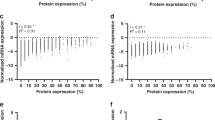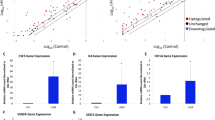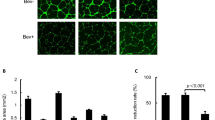Abstract
Vascular endothelial growth factor (VEGF) is known to be produced by various solid tumours and is thought to be involved in microvascular permeability and/or angiogenesis. To examine the relationship between VEGF expression in ovarian neoplasms and clinicopathological factors or patient survival, expression of VEGF was analysed immunohistochemically in 110 epithelial ovarian tumours. In addition, VEGF levels in the tumour fluid (17 patients), ascites (12 patients) and sera (38 patients) were determined using enzyme immunoassay. Positive immunostaining for VEGF was observed in 97% (68 out of 70) of ovarian carcinomas, which was significantly higher than that of tumours of low malignant potential (LMP) (13 out of 25; 52%) and benign cystadenomas (5 out of 15; 33%) (P < 0.01). In ovarian carcinomas, strong VEGF immunostaining was also observed more frequently in tumours of clear cell type (P < 0.05) in the advanced stage of disease (P < 0.05) and with positive peritoneal cytology (P < 0.01). Patients with strong VEGF staining had poorer survival rates than those with weak or no immunostaining for VEGF (P < 0.01). These findings suggest that strong VEGF expression plays an important role in the tumour progression of ovarian carcinoma. The enzyme immunoassay revealed higher serum VEGF levels in carcinoma patients than those in patients with LMP or benign tumours (P < 0.01). Serum VEGF levels decreased after the successful removal of tumours in ovarian cancer patients and, in one patient, the serum VEGF level was re-elevated during relapse. Therefore, serum VEGF could be used as a marker for monitoring the clinical course of ovarian cancer patients.
This is a preview of subscription content, access via your institution
Access options
Subscribe to this journal
Receive 24 print issues and online access
$259.00 per year
only $10.79 per issue
Buy this article
- Purchase on Springer Link
- Instant access to full article PDF
Prices may be subject to local taxes which are calculated during checkout
Similar content being viewed by others
Author information
Authors and Affiliations
Rights and permissions
About this article
Cite this article
Yamamoto, S., Konishi, I., Mandai, M. et al. Expression of vascular endothelial growth factor (VEGF) in epithelial ovarian neoplasms: correlation with clinicopathology and patient survival, and analysis of serum VEGF levels. Br J Cancer 76, 1221–1227 (1997). https://doi.org/10.1038/bjc.1997.537
Issue Date:
DOI: https://doi.org/10.1038/bjc.1997.537
This article is cited by
-
Frontline Maintenance Treatment for Ovarian Cancer
Current Oncology Reports (2021)
-
Personalized cancer vaccine strategy elicits polyfunctional T cells and demonstrates clinical benefits in ovarian cancer
npj Vaccines (2021)
-
Expert recommendations on the management of hypertension in patients with ovarian and cervical cancer receiving bevacizumab in the UK
British Journal of Cancer (2019)
-
Vascular endothelial growth factor receptor 2 (VEGFR2) correlates with long-term survival in patients with advanced high-grade serous ovarian cancer (HGSOC): a study from the Tumor Bank Ovarian Cancer (TOC) Consortium
Journal of Cancer Research and Clinical Oncology (2019)
-
Expression of vascular endothelial growth factor receptor 2 and clinical response to lenvatinib in patients with anaplastic thyroid cancer
Cancer Chemotherapy and Pharmacology (2018)



